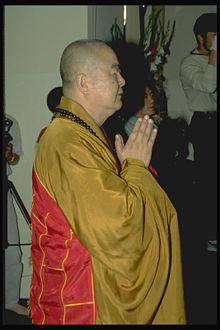Hsing Yun
Hsing Yun (TC: 星雲大師; Hanyu Pinyin: Xīngyún Dàshī) (July 22, 1927-Feb. 5, 2023) is a renowned Chinese Buddhist monk, as well as an important figure in modern Mahayana Buddhism.
As the founder of the Fo Guang Shan Buddhist Order, one of the largest religious and humanitarian organization in the Republic of China, he is well known and recognized in the international Buddhist community for his humanitarian work, calligraphy, Dharma propagation, and writing. As an active philanthropist, Hsing Yun contributes in pushing forth the ideal of Humanistic Buddhism, a modern Buddhist philosophy preached by many modern teachers of the Buddhist faith. He is well-known among Chinese Buddhists around the world and has received praise from many teachers. So far, more than 5,000 monastic disciples have been tonsured under Hsing Yun, with over a million lay followers worldwide.
Hsing Yun is a forty-eighth generation lineage holder of the Linji Chan (Rinzai Zen) school through Master Zhi Kai, his teacher.
Starting in the 1950s, Hsing Yun started making many achievements at an early age. He taught numerous classes, built many schools for children, recorded the first Buddhist hymns, and was promoted as an executive in many Buddhist associations. In 1957, Hsing Yun established a Buddhist cultural center in which a variety of Buddhist books are published with training tools such as audio and visual aids. In 1959, Hsing Yun also supported the Tibetan movement against communist suppression, and organized the first float parade in celebration of Wesak in Taiwan.
Perhaps one of Hsing Yun's influential achievements was his push for Wesak to become a national holiday in Taiwan, a wish that had been granted by former ROC President Lee Teng-hui in 2000. However, it is not celebrated officially by all of the people in the ROC.
Hsing Yun was one of eight venerables who proposed the World Buddhist Forum in China in 2004, a suggestion that won support from Buddhist circles in countries like Japan and the Republic of Korea.
He passed away on February 5, 2023 after an illness at the age of 95. The announcement of his death was delayed in order for his worldwide branch temples to finish celebrating ceremonies on the Lantern Festival, the last day of the Lunar New Year celebration. Per his wishes, he requested to be returned to Fo Guang Shan where he could die peacefully. He had also requested that no extravagant funeral arrangements be made, eschewing the traditional 49 day mourning period down to seven days.
Expansion of the Dharma
In 1967, Hsing Yun purchased more than 30 hectares in Ta Shu Township, Kaohsiung County as the site for the construction of a monastery. The groundbreaking ceremony was held on May 16th. He began by building the colleges and their dormitories, and working slowly towards building the shrines.
During that time that was spent clearing the mountains, the endless toiling away, wave upon wave of physical strain, the planning that carried on into all hours of the day, the barrage of floods and other natural disasters, and the belligerent mobs that surrounded the mountain were all quite beyond description. On windy and sunny days, the workers clothes would be soaked in sweat, dried up, and then soaked up again. They would be discussing throughout the day and go to bed late at night, and then as soon as the sun came out, they would work again. However, in the momentum of an incomparable courage, and by the blood and sweat of the laborers, the vast wilderness was transformed into the scenic Fo Guang Shan today.
Soon after the building of Fo Guang Shan, many countries, including most parts of Taiwan, each had their own Fo Guang Shan branch temple. Hsi Lai Temple (USA), Nan Tien Temple (Australia), and Nan Hua Temple (South Africa) are among the biggest branch temples. Fo Guang Shan branch temples can be found in the United States, Canada, Brazil, Japan, Hong Kong, Thailand, Malaysia, Australia (Brisbane and Wollongong), France, the Netherlands, South Africa, New Zealand and the United Kingdom.
Awards and recognitions
- 1978- Honorary Ph.D. by the University of Oriental Studies in Los Angeles
- 1979- Taiwan's Social Education Construction Award
- 1980- Promoted "Guiding Master" for the Buddhist Association of Taiwan
- 1981- Promoted World Buddhist Sangha Council executive member
- 1982- Awarded the Award of Excellence for Public Welfare Social for Religious Organizations and Indiviuals, appointment from Taiwan's Chinese Culture University
- 1984- Awarded for meritorious service in social education
- 1985- Elected honorary president of the World Fellowship of Buddhist Youths (WFBY)
- 1986- Becomes honorary citizen of Kaohsiung, Taiwan
- 1988- Becomes honorary citizen of Alhambra, California
- 1989- Awarded the Golden Bell Award for his aired Dharma lecture on TTV
- 1992- Elected permanent honorary president of the World Fellowship of Buddhists
- 1990- Awarded the Golden Tripod Award for the directed compilation of the Fo Guang Buddhist Dictionary
- 1992- South Africa grants land as an award to Fo Guang Shan (land used to build Nan Hua Temple), Awarded the Gentle Breeze Award and Outstanding Social Improvement Award, becomes honorary citizen of Austin, Texas, presented a certificate of appreciation from March Fong Eu, the California Secretary of State
- 1994- Austin, Texas declares September 10 to be Austin Fo Guang Day, presented a key to the city from then Mayor Gus Garcia
- 1997- Awarded the Social Construction Award for the airing of the TV film "Lotus Heart" on CTV, earns first class medals from the Ministry of the Interior and Ministry of Foreign Affairs in Taiwan, earns the Hua Xia medal, the highest medal given to a citizen of Taiwan
- 1998- Honorary citizen of Houston, Texas, declared Houston Fo Guang Day on June 20th
- 1999- Awarded the National Public Welfare award from President Lee Teng-hui
- 2000- Hsing Yun's book "Historias Ch'an" becomes number one on the bestseller book chart in Brazil
- 2003- Honorary Ph. D from Maha Chulalongkorn Buddhist University
